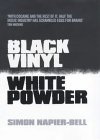

Subject: Re: Japan Questions
Date: 18 July 2002
Simon:
OK Paul - I'm braced and ready. Fire off the questions.
Paul:
Excellent. I'll start at the beginning. In "Black Vinyl White Powder"
you wrote that after signing Japan you made a demo tape with
them and sent it 'round the record companies. Can you recall what was
on that demo tape?
Simon:
The first demo tape after signing Japan was all their own songs -
reaction was NIL. I don't remember if any of those songs survived to be
recorded on their first album.
Paul:
Was that the first time they had been in a recording studio?
Simon:
First proper studio recording was Steve Rowland producing for Hansa.
Some of those tracks have been issued. I remember Mick had the clap at
the time and kept being unable to resist a drink before his course of
penicillin was complete. 
Paul:
Did you produce the demo recordings?
Simon:
Yes. I produced the demo recordings. They were done at a small studio
in Denmark Street that was owned by Billy Ocean's mangaer (but I have
now forgotten the name of it).
Paul:
You mention in the book that Japan used to perform a set of covers and
originals. Were any of the cover versions, such as "I Shot The Sheriff"
ever recorded?
Simon:
After the lack of response the Japan's first demos they put together a
set that consisted of one of their own songs alternating with a cover
of a well-known hit - "I Shot The Sheriff" "This Old Heart Of Mine" a
couple of Chic's hits, things like that. And all these were recorded. I
decided to make a sort of 'live' album. We went into the small studio
at IBC in Portland Place and did their whole set in four days - twenty
songs. The only copy of the tape was lost sometime in the late eighties
when it was sent to a studio for copying and never came back.
Paul:
Any truth in the rumour that the group made some recordings with Jim
Capaldi?
Simon:
I know nothing about Jim Capaldi recording with them. (But it could
have been - my memory's not perfect. But why would they need him when
they had a drummer like Steve?)
Paul:
There's a rumour that in 1978 a TV commercial was made for Japan, which
featured David turning around to reveal a superimposed pair of breasts.
Any truth in that? 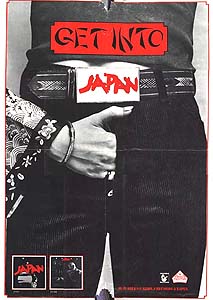
Simon:
In 1978 Japan made a film for use at their live shows. It was projected
behind them during four or five numbers in the middle of their set - I
don't remember which ones apart from Rhodesia. I think it contained a
picture something along the lines of what you described. Actually -
somewhere - I still have the original (and only copy) of that film. Any
offers?
Paul:
What did the group think about those infamous "Get Into Japan"
hand-in-fly adverts at the time? Do those adverts actually feature
group members in them? Whose hand was it?
Simon:
I think at the time the group quite liked the 'Get Into Japan' fly ad.
It was not one of the group, it was a mannequin from a shop window. As
for the hand, it was a secretary at the ad agency.
Paul:
What's Ray Singer up to these days? ( I also went on to ask about how
to contact him etc)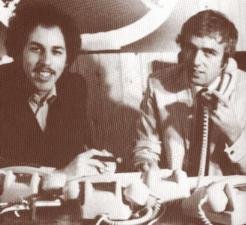
Simon:
Ray's been writing a musical about the Sixties and the life and times
of Peter Sarstedt. He's certainly contactable by me, but I don't know
if he would be by you. Flattery would probably get you everywhere. I'll
ask him if he'll accept your call.
Paul:
Have you heard the club track "I Can't Wait" by Lil Devious which is a
Norman Cook style DJ mix of "Adolescent Sex" and "Sometimes I Fell So
Low"?
Simon:
No I haven't heard the club track of "Adolescent Sex" and "Sometimes I
Fell So Low", though I've heard ABOUT it. Is it any good?
Paul:
Rob Dean mentioned in an interview about 10 years ago that the group
recorded a couple of tracks with orchestra backing (and a session
keyboardist in the Rick Wakeman mould). This was before Adolescent Sex
was released. Can you tell me anything more about that? Did
this keyboardist end up playing on the album, as it doesn't sound like
Barbieri on tracks like "Suburban Love"?
Simon:
Rob Dean's comments about an orchestra and a session keyboardist would
have been the Steve Rowland sessions. (And if Jim Capaldi was ever
involved in anything it would have to have been that session too.) At
that stage, Richard wasn't a great keyboardist. He really came into his
own when synthesisers and computer music came to the fore.
Paul:
At what point did Connie become publicist for the group?
Simon:
Connie became publicist around 1978/9. She was a girl friend of my
partner Richard Chadwick. He asked me to give her a job and I put her
on the switchboard. By lunch time not one call had managed to go in or
out of the office so I fired her. She cried, then asked me could she do
publicity for Japan. I laughed. She left the office with some
photographs and came back in the evening to tell us that Derek Jewel
would do a five page piece on them in the Sunday Times magazine. The
next thing she did was devise the scam of David being 'The Most
Beautiful Man In the World'. From then on she was off and running. (If
David changed sex in the film/TV commerical you were talking about it
was Connie he changed into. The idea being nicked from Performance when
Mick Jagger appeared to be in bed with James Fox, but then somehow he
turned into Anita Pallanberg).
Paul:
Moving on a bit, is it true that a tour of Europe and Australia in 1978
had to be cancelled because Rob Dean injured his leg?
Simon:
I don't know about a tour of Europe and Australia being cancelled
because of Rob's leg (it might have been a useful get-out for a tour
which we were unable to make happen).
Paul:
About the first Japanese tour - in your first book there's an amusing
anecdote (where you don't mention a specific band) about how you had
trouble getting a singer onstage at his first big concert. Were you
writing about Japan at the Budokan?
Simon:
No - not Japan - not the Budokan.
Paul:
Did David's tonsillitis lead to his changed vocal style by the time of
"Life In Tokyo"? 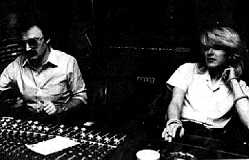
Simon:
I don't think David swapped vocal styles because of tonsilitis - just a
cooler image to go with the new hairstyle, which happened at exactly
the same time.
Paul:
"Life In Tokyo" is an odd one. Various magazine clippings state that
Sylvian went out to LA to make the record. Do the rest of the group
actually play on it?
Simon:
"Life In Tokyo" was the whole group. David went first with me and met
with Giorgio Moroder. The group came a few days later and rehearsed for
a week before going into the studio.
Paul:
Is it true that for the 1982 "Special Remix" of Tokyo, where no remixer
is credited, that the group re-recorded some parts (e.g. Mick's bass) 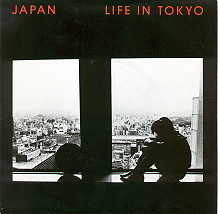
Simon:
No idea about this.
Paul:
Was the "Life In Tokyo Theme" b-side intentionally slow, or was it a
Hansa error?
Simon:
Nor this.
Paul:
Did you freak out (as I did) when Tommy Vance played this slow version
on the BBC Top 40 chart show?
Simon:
Didn't know about it.
Paul:
Can you tell me anything about the recording of "European Son" and "All
Tomorrows Parties"?
Simon:
"European Son" was recorded at DJM studios and was specifically
intended to be at the same tempo as Boogie Wonderland (132BPM) though I
can't remember why. "All Tomorrows Parties" I've forgotten about. 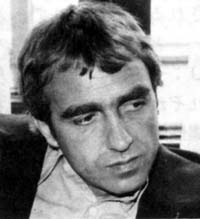
Paul:
How different were your original productions from the John Punter
remixes?
Simon:
Can't remember.
Paul:
Is it your mix that appeared on the "Assemblage" compilation?
Simon:
Not sure.
Paul:
Did you record any other tracks at the time?
Simon:
Can't remember.
Paul:
"A Foreign Place" is a very strange track. It appears to be in the
style of the Tin Drum era, but appeared as a Hansa B-side (the Quiet
Life re-issue in 1981), and then alongside later material on
"Exorcising Ghosts". When was it recorded?
Simon:
I'm not sure, I think at the same time as the "Quiet Life" album. 
Paul:
What kind of food did they serve at The Penguin Cafe? (note that the
only picture I have of food from the place shows Connie munching into a
puff pastry version of a Mick Karn sculpture...)
Simon:
I don't know. The band ate in cafe's - I ate in restaurants.
Paul:
It's been mentioned before that another producer was considered for
"Quiet Life" before John Punter came on board. Who was that?
Simon:
I seem to remember we considered quite a few people but I can't for the
life of me remember who.
Paul:
Was the change in the Japan image something they came up with
themselves?
Simon:
Yes - all down to David.
Paul:
Was a full live album recorded during the Quiet Life tour? The 4 tracks
that came out on the EP "Live In Japan" are amazing.
Simon:
Everything was recorded because John Punter went and did the live sound
- but I've no idea what happened to all the tapes. 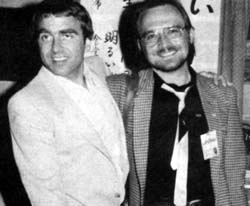
Paul:
I have a video recording of Mick getting flanned on Tiswas, while
trying to promote the Quiet Life single. Sally James makes it clear
that Mick was standing in for someone else? Was David originally booked
for a flanning?
Simon:
David would go nowhere and do nothing if he felt his music wasn't being
taken seriously.
Paul:
Any impressions about YMO and Sakamoto? At the time they first met, was
it motivated by business, or genuine musical interest?
Simon:
Musical interest.
Paul:
Was it easy dealing with YMO's management?
Simon:
Yeah - the group made friends with the group - I made friends with the
managers.
Paul:
What are you personal favourite memories regarding Japan? 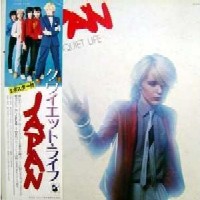
Simon:
Groups are always best at the beginning but Japan kept pretty
worthwhile all the way through. I had an incredible drive through the
redwood mountains behind LA once with David, listening to Jean Michel
Jarre and there was the time I got a thousand dollars from the record
company to buy all the group clothes for a record cover shoot. David
blew it all on one jacket - a red leather one - so that was what the
sleeve had to be ("Quiet Life"). We all had endless good fun touring
Japan. They were the best humoured bunch of guys I ever
managed.
Paul:
Which are your personal favourite tracks by them?
Simon:
All the POLAROIDS album
Paul:
What are your current plans?
Simon:
Managing a Russian group called SMASH!! - writing another
book - lecturing - drinking - eating. The next book is as much travel
as music business, but it will have a fair bit of Japan in it - more
than Black Vinyl had.
Simon
Napier-Bell's two books
"You Don't Have To Say You Love Me" and
"Black Vinyl White Powder" are both available in all good
book shops,
and online here. Aside from both being very entertaining in
their own right, they are well worth buying for the Japan related
content; the first has lots of background on Ray Singer and Simon
himself, the second features lengthy anecdotes about Japan and the
major players at Hansa. You'll never see Richard Barbieri in quite the
same light again, that's for sure.



